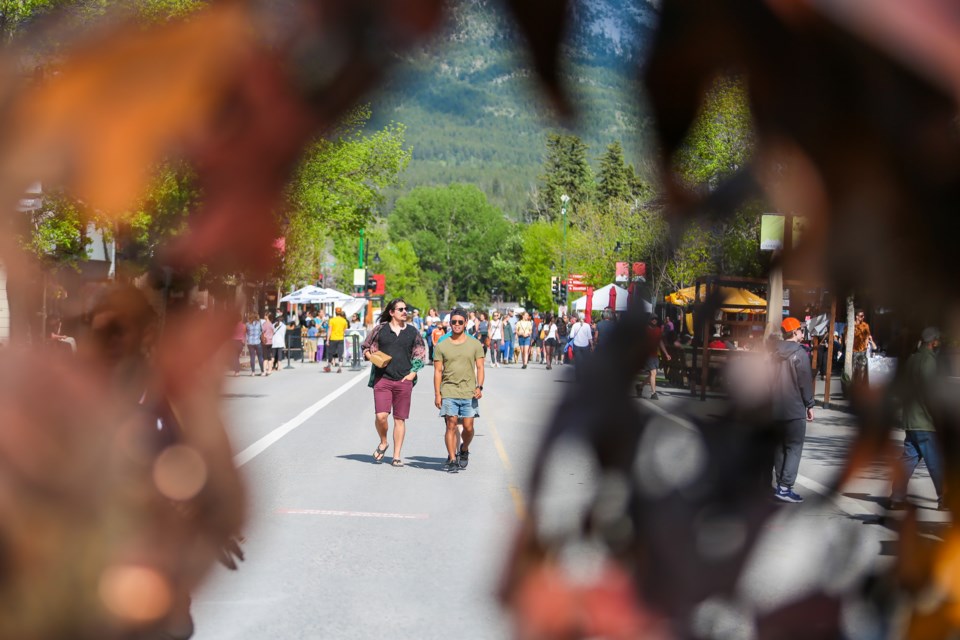CANMORE – As COVID-19 public health restrictions are being eased in Alberta, Canmore council received an update on the work completed as part of its business response plan at the outbreak of the pandemic.
The Town of Canmore's committee of the whole heard of the nearly two years of work undertaken since it was first approved by the previous council in June 2020 and the work still ongoing in the community.
At the beginning of the pandemic, tourism communities such as Canmore and Banff were devastated by the closures and travel restrictions, but businesses have mostly found ways to remain relevant to survive.
“We did see business closures, but we didn’t see them in the anticipated numbers we initially saw,” said Eleanor Miclette, the Town of Canmore's manager of economic development.
“We recognize some businesses have been holding on by a thread, but we did track very specifically if COVID was the primary reason for business closure. We saw 60 businesses indicate that was the reason.”
There were 30 businesses in 2020 and 31 in 2021 that indicated the main reason for their closure was the pandemic, according to statistics in the committee’s agenda.
In 2020, 298 business licences weren’t renewed and a further 255 in 2021. The majority were micro or small business owners.
However, at the end of 2021, there were 2,235 business licences registered in Canmore, including 547 new ones last year, the majority being micro or small business owners.
The response plan was allocated $281,000 from the tax stabilization fund to go towards economic development to help struggling businesses in the pandemic.
In the nearly two years of work, roughly $235,000 was spent on various recovery programs and supports. The unspent $46,000 will be returned to the tax stabilization reserve, Miclette told the committee.
She said the municipality worked in partnership with organizations such as the Bow Valley Chamber of Commerce, Tourism Canmore Kananaskis, the Job Resource Centre, the Downtown BIA and several more.
The aim of the programs was to help with business retention, protecting jobs, filling any gaps in provincial or federal funding and striving to reduce potential business closures.
“We recognized we couldn’t do it all,” Miclette said. "There was not enough tax money in our coffers to enter into that space. We could focus on business resilience, job protection, look where the gaps were in federal and provincial funding and try to reduce the number of permanent business closures related to the pandemic and add to programming that would not add to the debt load of our business community.”
There are still ongoing supports such as the digital services squad, peer mastermind mentorship program and financially fierce bootcamp to help local business owners.
According to the staff report, since March 2020 there were 67 newsletters emailed to more than 1,370 Canmore-based businesses. An online business hub was also created to help with information for businesses and an online job board was started with the Job Resource Centre to help employers and job seekers.
There were also four surveys – three in 2020 and one in 2021 – and engagement completed by the business recovery task force. Eleven webinars were held, a partnership with the Bow Valley Chamber of Commerce established the Bow Valley Restart Fund to help 35 Canmore-based businesses and the Business 2 Business voucher program was launched to help businesses.
A support local campaign was created and the Building Neighbourhoods Builds Community art project provided paid work for artists to promote community cohesion.
One concept that came into existence during the pandemic – the closure of Main Street – was initially contentious, but ended up gaining support and will return for a third year in 2022.
“We went from 'this will never work' to 'I’ve had the best years ever in my business'. I’ll recognize there are those that this is not the ideal and some this has been an amazing opportunity and it’s what keeping them alive,” Miclette said.
Miclette said doing the downtown area redevelopment plan with the planning department will help dig into the data.
"That’s where we start and it’ll be interesting to see what it looks like when we’re not under COVID restrictions and how it’ll impact and adding international travellers to the conversation will shift that approach," she said.
Labour seems to be the biggest concern moving forward, such as finding and retaining people.
“We’re not talking just the attraction, because Canmore’s an easy sell, it’s the retention of your labour. It’s the addition of accessible housing and supports, it’s the mental health of our current labour force that have been balancing multiple jobs," Miclette said. "It’s a bigger picture than just being labour, but hopefully as part of the recovery work we can dig into that piece a little more in the coming years.”
Several members of council – with multiple small business owners serving as elected officials – offered high praise for the work done under the business recovery plan.
“I don’t think much of us from the previous council knew what we were doing when we stuck our hands in the air in favour of it that day, but it was the right move,” Coun. Joanna McCallum said.
Councillors Wade Graham and Jeff Mah equally applauded the economic department’s work, with Graham calling it “heroic.”
“I have a business you helped out immensely and the pandemic was a crushing time that we also did probably five years of business development within the insanity of the pandemic,” Mah said. “It was completely through your help that made it possible.”




